The recent box-office success of documentary films such as Life (
Indeed, as a genre overlooked by the market for decades, the documentary's sudden popularity seems rather overwhelming. Yet, to those who have been devoted to the industry for years despite sparse funding, it's a validation long overdue.
Non-fictional cinema started to flourish around the lifting of martial law in 1987. Before this time documentary films mainly referred to newsreels, public-service films and propaganda pieces made by state-controlled film companies. Because of strict government monitoring, socially and politically sensitive issues were taboo to documentary filmmakers.
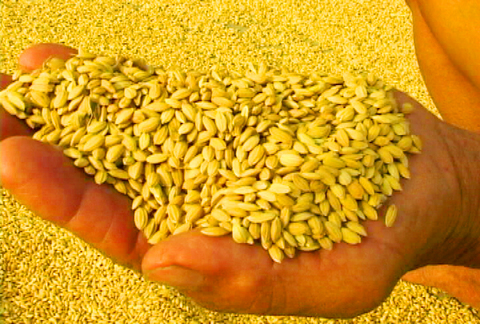
The genre experienced its first revolution around the mid-1980s, when independent filmmakers and social activists picked up their cameras to record and participate in the social and political movements that flowered in those years. The advance and popularization of technology gave filmmakers unprecedented freedom to express themselves with affordable and easy-to-operate filming equipment.
Meanwhile, waves of social movements springing from loosened political control gave filmmakers opportunities to look into subjects and issues hitherto unexplored and unknown to the public.
In the 1990s, government agencies and public institutes started to look at documentary cinema as an important part of cultural industry. Series of collaborations with private groups strengthened the development of the documentary film industry. The quality and quantity of documentaries have both gone up, while training available for young artists has built up a solid base.
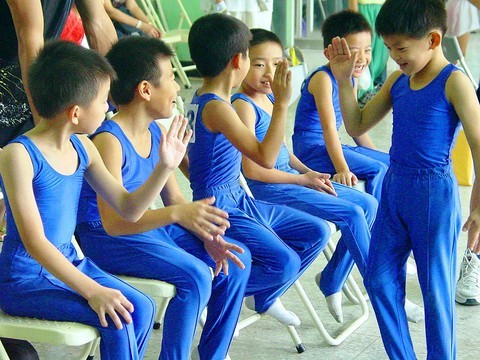
Medium of change
Full Shot Foundation (
"Most of the works made by our members deal with social issues. We go to minority groups, communities, or tribes, we stay with them for a long time, and bring out the issues to generate public discussions in the hope to make a change," said president of the foundation Tsai Jing-ru (
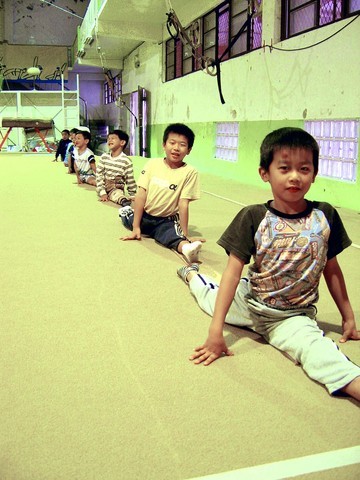
But the foundation does more than just make films. "Since 1990, we have held workshops to train anyone who is interested in documentary making on and off depending on our budget," Tsai said. The Council for Cultural Affairs (
"What we do is very challenging for a small group like us. But we take our social responsibilities very seriously," Tsai said. "We make films to open up dialogue and understanding among communities. We provide knowledge and skills to those who want to join the industry. And we seize any chances to show works in any occasion so that more people can see what has been going on in our society."
Public Television Service (

PTS holds a documentary short-film festival every year. They select a group of applicants and assist the inexperienced filmmakers in completing their works and then air them on the channel.
These days, more and more young movie industry talent is making the move to documentary cinema. Some have turned to it out of a sense of social responsibility; others use it merely as another, cheaper way to entertain audiences.
Social record
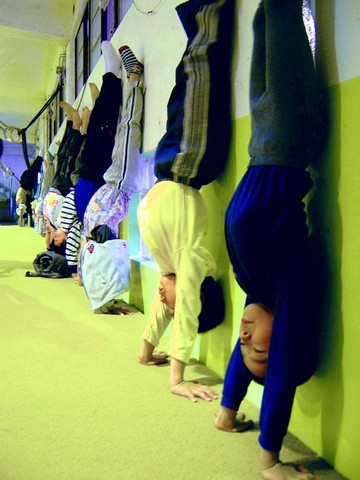
The co-director of Let It Be Yen Lan-chuan (顏蘭權) was driven to documentary making out of a desire to help people. In 1999, she was amont the filmmakers who went down to Nantou County (南投縣) after the 921 earthquake. She "felt that something more than news reports needed to be made" to document what was going on, so she went down on an impulse to start filming in the disaster area. The group also included Full Shot's founder Wu Yi-feng (吳乙峰), who ended up making Taiwan's most successful documentary ever -- Life (reviewed in the Taipei Times on Sept. 16, 2004). The film chronicled earthquake victims' daily struggle to rebuild in the weeks, months and years after the devastation. The story deeply touched audiences and ticket sales grossed over NT$10 million.
Similarly, Yen's Let It Be tells the story of Taiwan's common people struggling in the face of hardship. This time the stars are Tainan County rice farmers in their 60s and 70s. With the younger generation leaving for the city, the farmers face pressure from not only because of their advancing age but also due to the competition of foreign agricultural imports in the wake of Taiwan's WTO membership.
The idea for the documentary was born while Yen and another director, Cres Juang (

"We saw the situation there and we just knew everything would soon change," Yen said. It was apparent that the rice farmers' way of life was on the brink of extinction. "For example," she said, "there was only man left who owned a cow in the whole village. This was very distressing to us, so we decided to make a documentary about it."
After 15 months of filming the elderly farmers and another 15 spent cutting 350 hours of footage down to two hours, the directors had their documentary, but they had no idea what to expect from the public. Yen was afraid that nobody would want to watch the film. "It's long and slow and it's about peasants, which is not popular subject matter in Taiwan these days."
Yet the sweet, simple honesty of the characters in Let It Be won over the hearts of audiences all over Taiwan and the documentary pulled in NT$6 million at the box office.
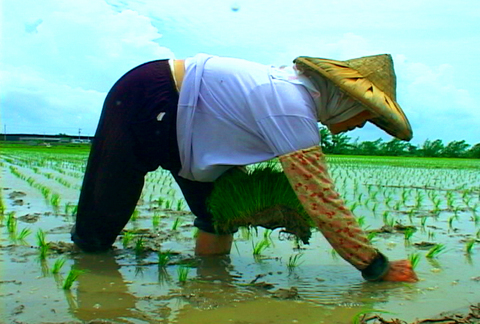
Jumping genres
Lin Yu-hsien (
He says he got into documentaries "by accident" when, a few years ago, he found himself out of work due to the movie industry's slump. "There were no movies for us to work on, so we decided to make our own movies," Lin said. "We didn't have much of a budget, so we chose to start with documentaries."
After making a few short documentaries, Lin headed home to Ilan (
But Lin and his filmmaking partner Chuang Ching-shen (
While not downplaying the success of documentary cinema, Lin feels it is not the solution to Taiwan's movie woes some are hailing it as.
"Lately everybody feels that documentaries are popular and great and that they can save Taiwan's film industry, so we should all just stick to making documentaries. But this is wrong," Lin said. "I think we were noticed because we provided a different style of movie. Taiwan's movies are too depressing: Life is hardship and people don't to go to the theater to see more hardship. Our film is energetic and funny, and that's why people noticed it -- not because it is a documentary."
Jump! Boys can be rented from Blockbuster or Asia1 (

Towering high above Taiwan’s capital city at 508 meters, Taipei 101 dominates the skyline. The earthquake-proof skyscraper of steel and glass has captured the imagination of professional rock climber Alex Honnold for more than a decade. Tomorrow morning, he will climb it in his signature free solo style — without ropes or protective equipment. And Netflix will broadcast it — live. The event’s announcement has drawn both excitement and trepidation, as well as some concerns over the ethical implications of attempting such a high-risk endeavor on live broadcast. Many have questioned Honnold’s desire to continues his free-solo climbs now that he’s a

Lines between cop and criminal get murky in Joe Carnahan’s The Rip, a crime thriller set across one foggy Miami night, starring Matt Damon and Ben Affleck. Damon and Affleck, of course, are so closely associated with Boston — most recently they produced the 2024 heist movie The Instigators there — that a detour to South Florida puts them, a little awkwardly, in an entirely different movie landscape. This is Miami Vice territory or Elmore Leonard Land, not Southie or The Town. In The Rip, they play Miami narcotics officers who come upon a cartel stash house that Lt. Dane Dumars (Damon)

Francis William White, an Englishman who late in the 1860s served as Commissioner of the Imperial Customs Service in Tainan, published the tale of a jaunt he took one winter in 1868: A visit to the interior of south Formosa (1870). White’s journey took him into the mountains, where he mused on the difficult terrain and the ease with which his little group could be ambushed in the crags and dense vegetation. At one point he stays at the house of a local near a stream on the border of indigenous territory: “Their matchlocks, which were kept in excellent order,

Today Taiwanese accept as legitimate government control of many aspects of land use. That legitimacy hides in plain sight the way the system of authoritarian land grabs that favored big firms in the developmentalist era has given way to a government land grab system that favors big developers in the modern democratic era. Articles 142 and 143 of the Republic of China (ROC) Constitution form the basis of that control. They incorporate the thinking of Sun Yat-sen (孫逸仙) in considering the problems of land in China. Article 143 states: “All land within the territory of the Republic of China shall